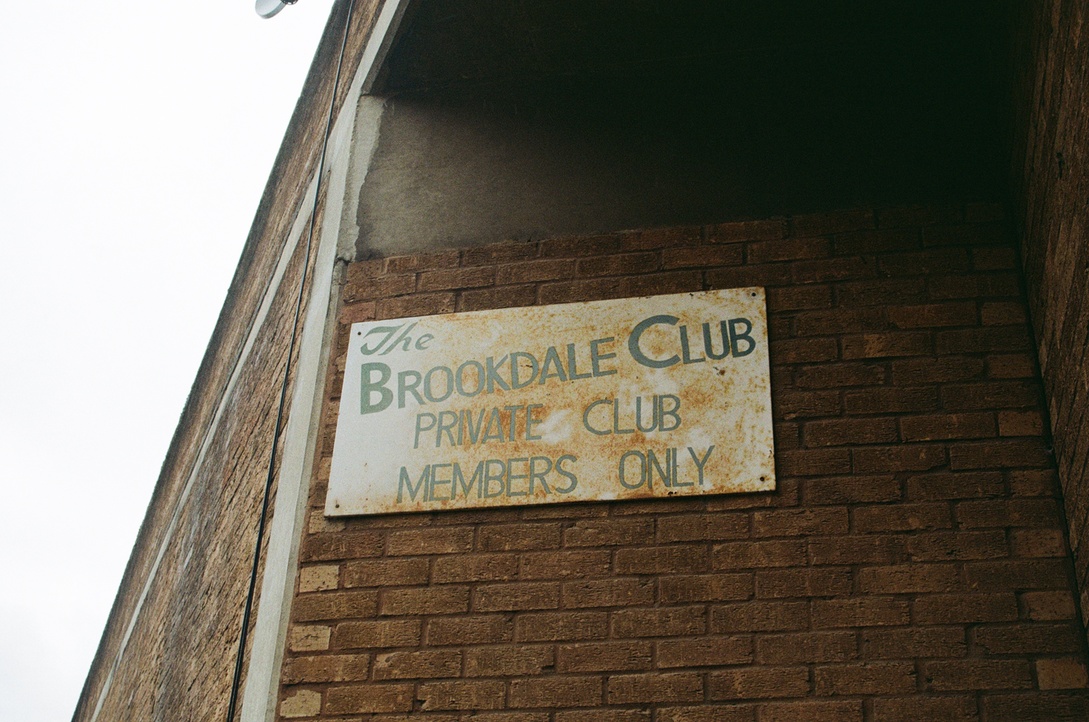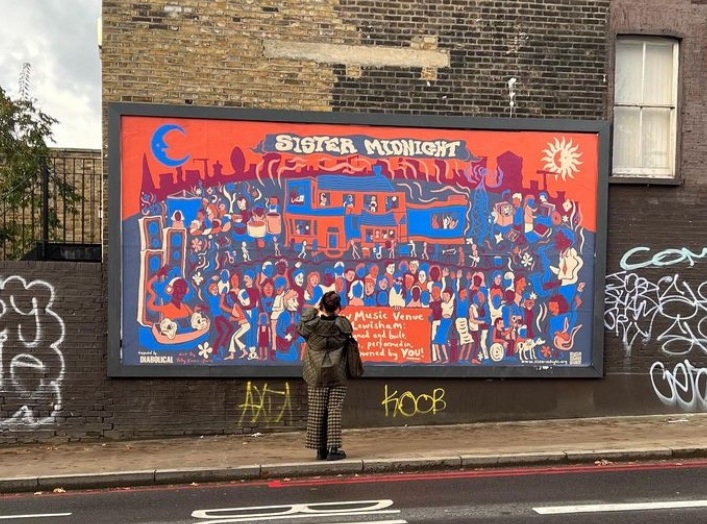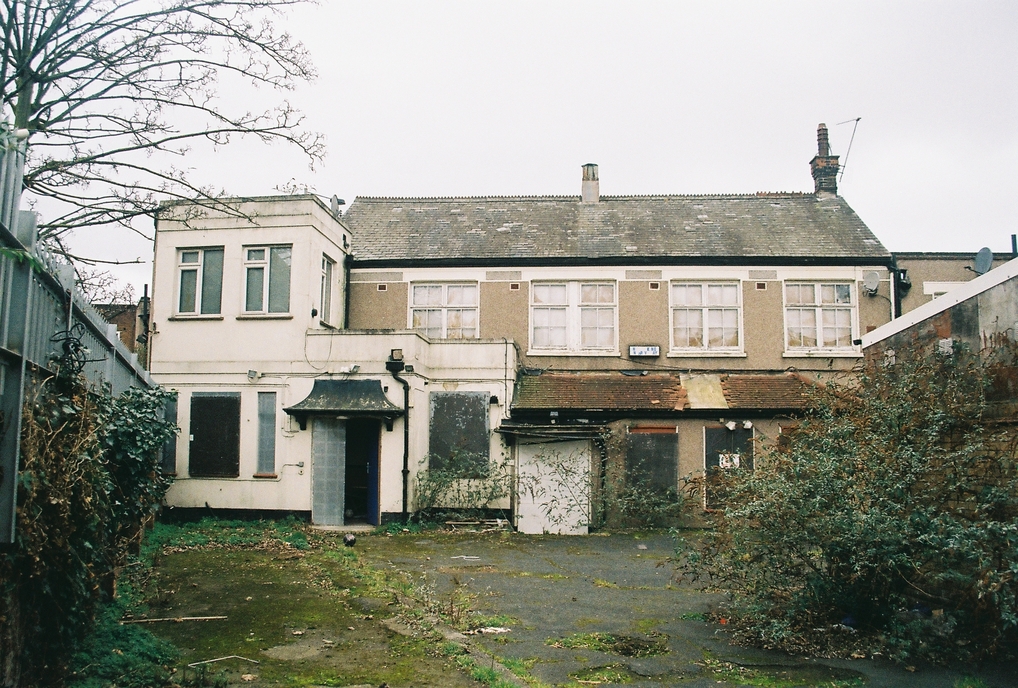Interview | Lenny Watson
Lenny Watson, our BA in Live Event and Festival Management Tutor, lets us in on her work to launch a community live music venue with Sister Midnight.
With property prices and rents rising, London can be a challenging city for cultural entities such as live music venues to exist in.
This is why co-operative ventures like Sister Midnight, helmed by our BA Live Event and Festival Management Tutor Lenny Watson, are seen as so vital to the survival of live music.
Since 2021, the group, which includes DJ Sophie Farrell and Goat Girl's Lottie Pendlebury alongside Lenny, has been campaigning to create Lewisham's first community-owned music venue, bringing a much-needed cultural hub to the local area.
Sister Midnight now has 1,000 members and has raised over £350,000 through community investment (alongside £60,000 from the Beggars Group music label which owns XL Recordings and Rough Trade).
The journey to opening the space has been a long one but recently saw Sister Midnight featured in the Evening Standard alongside a number of other London co-operative collectives.
We caught up with Lenny to learn more about the group's work and ambitions, the module she leads at ICMP and why community spaces are so important for the future of live music...
Congratulations on the feature in the Evening Standard!
Thanks! It was a bit of a shock once I saw it in print, our faces right in the middle of the piece. I just thought we'd be featured but it's really cool in raising more awareness of what we're doing and our work.
How is Sister Midnight's journey to opening a community space progressing?
It's good but it's slow as there's so much bureaucracy to wade through.
Still, we've had great support from our community, we've now got planning permission and are looking for more support for what we do. Plenty of things are continuing to happen in the background and we're optimistic about the future.

How has teaching at ICMP been? How has it influenced your work outside of the classroom?
It's been super interesting and I'm now in my second year of teaching on the course.
This year there has been a real alignment between what I've been teaching, my own work outside of ICMP and what is happening currently in grassroots venues.
With Sister Midnight, a big part of our mission is to train venue operators, to have them understand the different ways we can run venues, and how different models can be more inclusive of and responsive to what communities actually want. It's about leveraging the power we have in communities to make them really work for the people living in them.
I love teaching at ICMP, it’s a great opportunity to speak to a future generation of music industry professionals, make them understand the stories and the people behind these venues, and what it means for people to have a music venue near them."
It can actually change someone's life to have a good music venue in their local area which is why it's so important that they are done in the right way and reflective of what communities are.

How do you break down the module over the course?
I touch on a theme each week which we explore in different ways, we look at the current climate for venues, I talk a lot about the Music Venue Trust, that feels like it's at the core of this movement for cultural parity for grassroots venues.
With Sister Midnight, we do a lot of press and speak with big stakeholders and I get asked a lot about what my role is. And I always say I do whatever needs to be done. That is really similar for a lot of grassroots operators but I had a bit of a sense of shame about it, like it's not professional or a bit disorganised.
However, in reality, it's a very specialist way of working that requires incredible agility and resilience from everyone doing these jobs.
In live music, you need to have professionals who know the whole of the business and can jump into any role at any time to pick up on stuff. That is super skilled and something we need to champion, just how important this way of working is at a grassroots level."
We also look at communities, ethos and identity, these values that are embedded into venues, and how to recognise what these values are - how do you decode what a venue is about? We look at architecture, legal structures, licensing and regulations, agent of change too - all of this and the constraints venues sometimes operate under.
We talk about scene building and artistic development, I love teaching about Brian Eno's ideas about scenius vs genius. It really gets people thinking in a way that they weren't before.

What do your students want to pursue?
It's a real mix, we have some people who are interested in running their own spaces, it's got a real relevance to their ambitions and that's a great feeling, giving them the skills to help them fulfil their careers.
We do have a range of ambitions and if they are going to be in the industry, they are probably going to have to work with a grassroots music venue at some stage. I feel that it's so important to demystify what they are and the challenges they face.
Having students leaving this module and knowing how tough the climate is for them means that the next time they play at a little pub back room or promote at their local venue, they might approach it differently."
If the whole of the industry worked more cooperatively, then it would be in a better place.
How important is the idea of community to the future of live music?
We've heard a lot about how venues are struggling and all these closures, that is true and needs to be talked about. However, another story that is increasing in volume is that of how communities are responding with new ideas and resilience to create cultural infrastructure from the ground up where it's needed.
While we do need to keep talking about these sector-wide challenges, we also need to celebrate the innovation that has been born out of these problems too.
The co-op movement is really coming together to live and breath these new business practices and share these skills. It's exciting to see and be a part of.
Visit sistermidnight.org to find out more and how to support their work.
Learn how to conceive and create live event experiences that last a lifetime
Gain a holistic overview of the live events industry with our pioneering BA (Hons) Live Event and Festival Management degree. Explore the concepts of live production, event management and the live music ecosystem, as you expand and put into practice your creative and entrepreneurial skills. Developed in consultation with key bodies in the industry, it has the ever-evolving live music ecosystem at its core.
Hit the link below, or speak to our friendly Admissions Team via our Live Chat or phone on 020 8038 3325, to find out more.
Full course details
Gain a holistic overview of the live events industry with our pioneering BA (Hons) Live Event and Festival Management degree. Explore the concepts of live production, event management and the live music ecosystem, as you expand and put into practice your creative and entrepreneurial skills. Developed in consultation with key bodies in the industry, it has the ever-evolving live music ecosystem at its core.
Hit the link below, or speak to our friendly Admissions Team via our Live Chat or phone on 020 8038 3325, to find out more.




